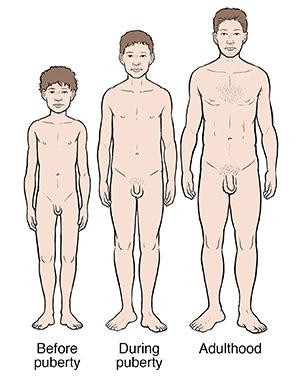Puberty: Normal Growth and Development in Boys
Your child has reached the stage of adolescence called puberty. During this stage, your child’s body begins to develop and become sexually mature. The information below explains what to expect during this stage of your child’s growth and development.
How long does puberty last?
In boys, puberty usually begins between ages 10 and 16. Once it begins, it lasts about 2 to 5 years. But every child is different. And there is a wide range of what is normal. Your child may begin puberty a little earlier or later and finish sooner or later than their friends. If you have questions or concerns about your child’s development, talk to their healthcare provider.
Physical changes during puberty

-
Height and weight changes:
-
About 20% of total adult height is gained during puberty. Typically, boys have their height spurt fairly late in puberty.
-
About 50% of normal adult weight is gained during puberty. Boys often have a lower percentage of body fat by the end of puberty.
-
Voice changes: Boys' voices get lower and deeper during puberty.
-
Sexual changes and hair growth:
-
At the start of puberty, the testicles increase in size, drop lower, and the scrotum darkens, becomes looser, and becomes dotted with small bumps. Later in puberty, the penis begins to grow and mature.
-
Pubic hair begins to grow shortly after changes in the scrotum. At first, it may be thin. It then gets darker and coarser. Boys also begin to grow hair in other new places, such as the chest, underarms, face, and legs about 2 years after the start of pubic hair growth.
-
Erections (stiffening of the penis as it becomes filled with blood) and nocturnal emissions (“wet dreams”) happen. This is most common in the later stages of puberty as the body begins to make sperm.
-
Acne and body odor:
Reassuring your child
-
Your child may be concerned that their peers are more or less developed than they are. Explain to your child that kids of the same age may be at different stages of puberty. Your child’s growth, whether slow or fast, is happening at the right rate for them.
-
Help your child adjust to their changing body. Offer solutions for body odor and acne (such as bathing more often, using deodorant, and using acne products).
-
Your child will likely feel uncomfortable discussing sexual changes with you. Let them know you're there to talk to. You may also try giving your child a book with information about puberty that they can read on their own.
Exams during puberty
As puberty begins, it’s important for your child to see their healthcare provider once a year. Keep bringing them in for regular health screenings. Know that, during puberty, health screenings will include an exam of your child without clothes. This lets the provider see how your child is progressing physically through puberty. Reassure your child that this exam is normal and expected. Also, parents may be asked to leave the room during part of the exam. This is so the child and the provider can have an honest and open discussion. If you have any questions or concerns, talk to your child’s healthcare provider.
Online Medical Reviewer:
Amy Finke RN BSN
Online Medical Reviewer:
Dan Brennan MD
Online Medical Reviewer:
Rita Sather RN
Date Last Reviewed:
10/1/2024
© 2000-2026 The StayWell Company, LLC. All rights reserved. This information is not intended as a substitute for professional medical care. Always follow your healthcare professional's instructions.